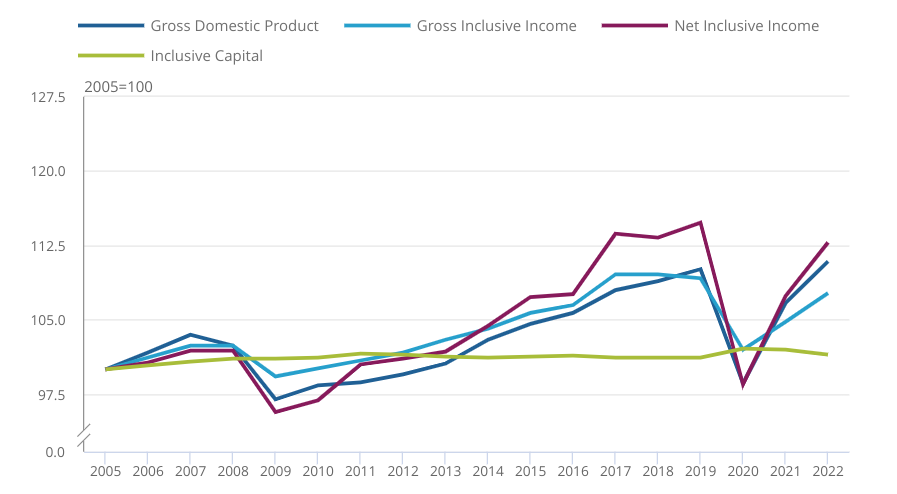Fresh data reveals ‘more complex picture of economic welfare’

Alternative measures of economic welfare suggest the economy may have recovered more slowly from the pandemic than traditional measures imply, and may even have been stagnant since 2017.
According to the Office for National Statistics (ONS), inclusive income per person in 2022 was still below levels reached just before the pandemic on both a gross and a net level, unlike GDP.
Growth in these alternative measures was also noticeably slower between 2017 and 2019. The ONS said this reflects a “more complex picture of economic welfare” than taking a market-centred metric like GDP.
GDP is the dominant measure of an economy’s welfare and is widely targeted by governments around the world, including the UK government. It measures the market and non-market production and consumption of goods and services.

Many advanced economies have suffered from a slowdown in GDP growth since the financial crisis. This slowdown has only become more pronounced in Europe since the pandemic.
The UK economy is only 2.9 per cent bigger than it was on the eve of the pandemic, according to the latest estimates, whereas the US economy is over 10 per cent bigger. Labour has put kick-starting economic growth at the heart of its agenda.
However, there are a range of activities excluded in the calculation of GDP which are relevant to a broader definition of economic well-being.
Gross inclusive income (GII) builds on the measure by factoring in some activities which are not included in GDP while broadening the scope of existing components.
It includes an adjustment to factor in the quality of public service output; a broader definition of intangible investments; and the inclusion of unpaid household labour within production.
GII also attempts to measure the value of ecosystem services, like the regulation of greenhouse gas and air pollution. According to the ONS, this measure has essentially been flat since 2017.
Net inclusive income (NII) subtracts depreciation of some of the additional capital stock, like intangibles, human capital and natural capital.
The ONS has previously said that these measures are intended to complement rather than replace GDP.
免责声明:投资有风险,本文并非投资建议,以上内容不应被视为任何金融产品的购买或出售要约、建议或邀请,作者或其他用户的任何相关讨论、评论或帖子也不应被视为此类内容。本文仅供一般参考,不考虑您的个人投资目标、财务状况或需求。TTM对信息的准确性和完整性不承担任何责任或保证,投资者应自行研究并在投资前寻求专业建议。
热议股票
- 1
- 2
- 3
- 4
- 5
- 6
- 7
- 8
- 9
- 10